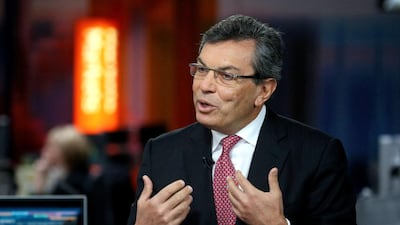A Syrian businessman who has worked for more than a decade to bolster civil society in his war-torn country has called on the international community – and the US in particular – to “stay with Syria” after the fall of Bashar Al Assad.
“It's not going to be a western type of democracy from day one. But it’s moving towards a democratic system, and a stable Syria is going to be very helpful to everyone, because it will curb Iran's influence in the region,” Ayman Asfari told The National in an exclusive interview.
Mr Asfari, the former chief executive of Petrofac, is the founder of Madaniya, an initiative led and funded by Syrians that aims to support the civic space in Syria and engage civil society in the political process.
A vocal critic of former president Mr Al Assad, he lobbied hard for years for international intervention in Syria. In 2013, the Syrian regime issued an arrest warrant for Mr Asfari, accusing him of funding the regime's opponents and “supporting terrorism”.
He described Syria's current state as fragile, akin to a critically ill patient, vulnerable to minor ailments.

“The situation in the country is very, very fragile, and any negative influence or interference could set us back quite a bit,” he said. “If we learnt anything from the last 50 years, is we do not want a system that we rely on an individual. We want an inclusive system where there are checks and balances for the power and authority of any individual, including [Syria’s de facto leader] Ahmad Al Shara.”
Mr Asfari added: “Power corrupts absolutely.”
As Donald Trump prepares to retake the White House, Mr Asfari called on the president-elect to re-evaluate Washington's engagement strategy with Damascus.
“We need engagement. I think the Trump administration has to engage positively in helping us manage this transition,” he said. “The worry that I have is that the US is looking at Syria only from the point of view of counter-terrorism, and they're only concerned about the issue of the re-emergence of ISIS.”
Last month, while Mr Trump met global leaders in Paris, armed fighters from Hayat Tahrir Al Sham entered Damascus, completing their overthrow of the Assad regime. But Mr Trump has shown little interest in deepening US involvement in Syria, stating on his Truth Social network: “Syria is a mess but is not our friend.”
Currently, about 2,000 US troops are stationed in Syria, their mission focusing on countering ISIS and supporting the Syrian Democratic Forces, a Kurdish-led coalition of militias.
Regardless of which way Washington turns, Mr Asfari hopes for a new and inclusive transitional government and the drafting of the constitution that prevents any rise of dictatorship akin to the Assad regime.
“What we don't want is a is a new government led by him [Mr Al Shara] and HTS, where you have members that are there … with no effective power. I'm hoping it will be genuinely representative and truly inclusive in order for it to be able to manage this very, critical and very difficult transition the next few years,” he said.














He believes Mr Al Shara, once an extremist who now advocates for pluralism and tolerance, will moderate his views even more, because Syrians are “pretty moderate, and many of them are conservative Muslims, but they don't want an Islamist regime”.
Mr Al Shara said in a recent interview with Al Arabiya that elections in Syria could take four years.
Mr Asfari also voiced concerns about the potential pitfalls of rushing into early elections in a nation lacking strong institutions or civil society.
“You would have possibly some of the wealthy people who have stolen money from the country, some of the Assad cronies. They could put money in a system which is fragile like this, and they could legitimise a candidate who's not acceptable,” he said.
During the roughly 13 years of civil war in the country, Mr Asfari expressed his support and contributed financially to the Syrian civil defence organisation known as the White Helmets, which lobbied for no-bombing zones to create safe areas for civilians under threat from Mr Al Assad and Russian aerial attacks.
With Mr Al Assad now gone, Mr Asfari said the White Helmets should integrate into the State Civil Defence Force and provide support for people across the country.
“The work that they are doing the last few years has been demining, taking out mines and providing humanitarian relief support. They've built an organisation that has been very effective in providing the Civil Defence support the areas where the regime didn't exist,” he explained.
As to his own future, Mr Asfari said he plans “to be part of the new Syria”, highlighting his readiness to leverage his expertise in business to attract foreign direct investment to aid in the country's reconstruction.


